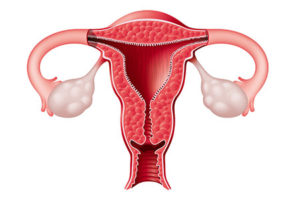The uterus supports pregnancy
 A healthy uterus is essential for the work we do at our Virginia fertility center. The uterus is the muscular organ that provides shelter and nourishment for a growing baby. During ovulation, the lining of the uterus (endometrium) begins to thicken to support a pregnancy.
A healthy uterus is essential for the work we do at our Virginia fertility center. The uterus is the muscular organ that provides shelter and nourishment for a growing baby. During ovulation, the lining of the uterus (endometrium) begins to thicken to support a pregnancy.
When a fertilized egg enters the uterus, it makes its way to the thickened endometrium and implants there, becoming an embryo and growing a placenta. The endometrium develops larger blood vessels so that oxygen and nutrients can be passed from the mother’s body to the baby’s through the placenta. The uterus expands to accommodate the growing baby and its protective cervix opens when the baby has fully developed, allowing it to pass through the birth canal and into the world.
The uterus supports pregnancy: potential disorders
Some of our Virginia fertility center patients have uterine disorders that can cause infertility or pregnancy loss without medical intervention. Here are some of the disorders that can disrupt the way the uterus supports pregnancy.
- Endometriosis. When the tissue lining the uterus begins to grow on the outside of the uterus, it can disrupt the release of a fertilized egg into the uterus.
- Uterine fibroids. Abnormal growths in the uterine tissue can disrupt the placenta’s attachment to the endometrium or limit the baby’s space to grow.
- Septate uterus. If a fertilized egg implants on the abnormal wall of tissue dividing the uterus, the baby may not be able to obtain enough nutrition to grow and develop.
- Uterine polyps. Abnormal growths in the endometrium can cause irregular periods and affect fertility.
- Dyssynchrony. When the endometrium and embryo are not both ready for implantation at the same time, an otherwise perfectly capable uterus can fail to support a pregnancy.
Accurate diagnosis and treatment of these conditions can often help restore the way the uterus supports pregnancy.
ERA testing may improve pregnancy success
For women with dyssynchrony or unexplained infertility, endometrial receptivity array testing (ERA testing) done at our Virginia fertility center can help determine the best time for implantation to occur. Altering the embryo transfer schedule to fit this window gives the uterus the best chance to do its job.
To learn more about ERA testing or other fertility services we provide, contact our office.
